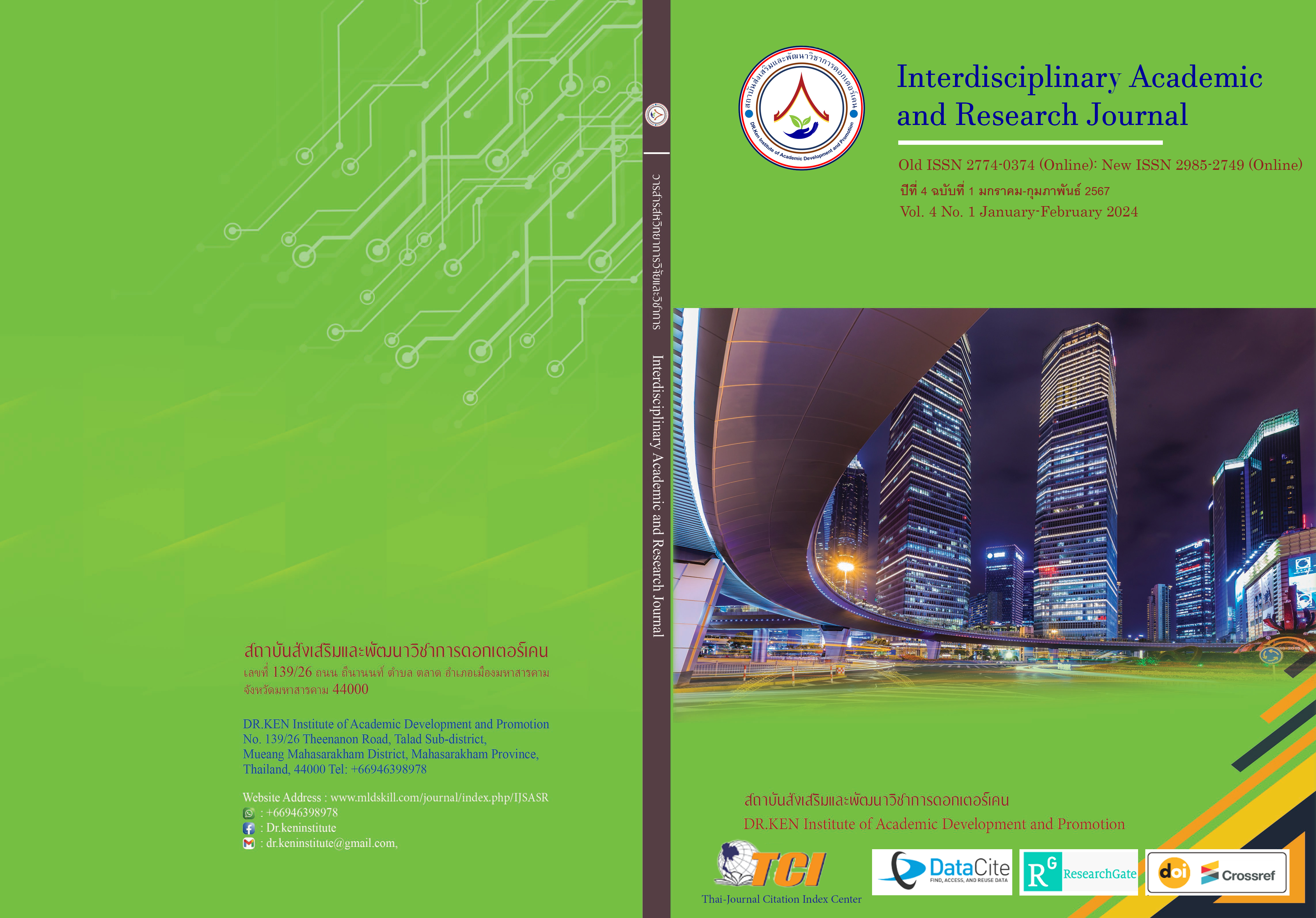Legal Problems Concerning the Control of Sharing Circle Under the Sharing Play Act B.E. 2534
DOI:
https://doi.org/10.60027/iarj.2024.272745Keywords:
Chairman of Share Lending Circle; , Legal EntityAbstract
Background and Aims: Sharing is considered a type of informal money-raising, but it is a legal and legal way to raise money outside the system. But it must be done under the terms and conditions specified by law. Although sharing is a form of fundraising, it is not an informal loan with an interest rate that is higher than what is required by law. Thus, this paper aims to (1) investigate the background, concepts, theories, and principles of the sharing circle under of Legal Entity Share Lending Circle Act B.E. 2534 and (2) explore the legal measures of Thailand and the foreign countries of the sharing circle under of Legal Entity the Share Lending Circle Act B.E. 2534, (3) analyze problems on the legal problems related of the sharing circle under of Legal Entity the Share Lending Circle Act B.E. 2534, (4) and propose approaches to solve the legal problems related of the sharing circle under of Legal Entity the Share Lending Circle Act B.E. 2534.
Methodology: This thesis applied a qualitative research methodology using documentary research. This thesis on the legal problems concerning the control of sharing circles under of Legal Entity the Share Lending Circle Act B.E. 2534
Results: (1) Regarding the problems of the chairman of the share lending circle of the Legal Entity, Section 5 of the Share Lending Circle Act B.E. 2534 prohibits the Legal Entity from being the chairman of the share lending circle or organizing the share lending circle in any case. This leads to difficulty in investigating the existence of the chairman of the share lending circle; (2) Regarding the problems of the ordinary person being the chairman of the share lending circle, Section 6 of the Share Lending Circle Act B.E. 2534 allows the ordinary person to be the chairman of the share lending circle or organize the share lending circle. This enables the violation of being the chairman of the share lending circle by (1)-(4) without the mechanisms for controlling and inspecting the violation of the restriction; (3) Regarding the permit issuance and the control of the share lending circle, the Share Lending Circle Act B.E. 2534 does not specify the permit application for doing a business as the chairman of the share lending circle or a person who organizes the share lending circle, which leads to a lack of mechanisms for registering and inspecting the business act of the chairman of the share lending circle; and (4) Regarding the problems of investigating the location of the share lending circle, the Share Lending Circle Act B.E. 2534 does not specify the location of the share lending circle leading a lack of information on locations or places in doing the business transaction, places in bidding share, and places in receiving the common funds in case of a person bidding a share. Therefore, the researcher would like to propose amendments to the Share Lending Circle Act B.E. 2534 to solve the legal problems by (1) allowing only the Legal Entity to do business as the chairman of the share lending circle, (2) prohibiting the ordinary person from doing the business as the chairman of the share lending circle, (3) specifying the permit application for doing a share lending business, and (4) informing the company location.
Conclusion: The study highlights significant legal challenges in the regulation of ride-sharing services. The existing law poses issues related to corporate and individual operators, lacks provisions for licensing and oversight, and fails to address the crucial aspect of location verification. To address these shortcomings, the researcher recommends amendments to the Ride-Sharing Act of 1991, specifically targeting restrictions on corporate involvement, prohibitions on individual operators, the implementation of licensing requirements, and the mandatory disclosure of business locations for effective oversight and control.
References
กรุงเทพธุรกิจ. (2564). ย้อนรอย 5 คดีดัง หลอกลงทุน. (ออนไลน์). Retrieved from: https://www.bangkokbiznews.com/business/954228.
วรีวรรณ์ พิพัฒนเกื้อกูล. (2566). การวิเคราะห์กลยุทธ์ทางการตลาดของธุรกิจการเล่นแชร์ออนไลน์. สารนิพนธ์การจัดการมหาบัณฑิต สาขาวิทยาลัยการจัดการ บัณฑิตวิทยาลัย มหาวิทยาลัยมหิดล.
วิทยา เบ็ญจาทิกุล. (2549). ปัญหาการบังคับใช้พระราชบัญญัติการเล่นแชร์ พ.ศ. 2534. วิทยานิพนธ์นิติศาสตรมหาบัณฑิต สาขานิติศาสตร์, บัณฑิตวิทยาลัย จุฬาลงกรณ์มหาวิทยาลัย.
สุจิรา จำปาทอง. (2556). หลักเกณฑ์การให้กู้ธุรกิจเงินกู้นอกระบบ. สารนิพนธ์บริหารธุรกิจมหาบัณฑิต สาขาการจัดการทั่วไป, มหาวิทยาลัยเทคโนโลยีราชมงคลธัญบุรี.
Downloads
Published
How to Cite
Issue
Section
License
Copyright (c) 2024 Suwanan Suwannabut, Siwaporn Saowakon

This work is licensed under a Creative Commons Attribution-NonCommercial-NoDerivatives 4.0 International License.
Copyright on any article in the Interdisciplinary Academic and Research Journal is retained by the author(s) under the under the Creative Commons Attribution-NonCommercial-NoDerivatives 4.0 International License. Permission to use text, content, images, etc. of publication. Any user to read, download, copy, distribute, print, search, or link to the full texts of articles, crawl them for indexing, pass them as data to software, or use them for any other lawful purpose. But do not use it for commercial use or with the intent to benefit any business.
















.png)


